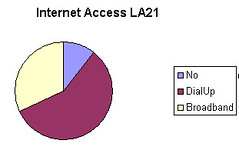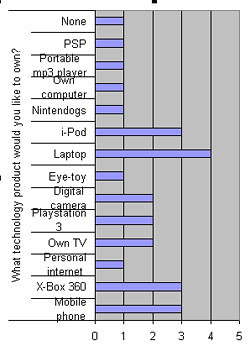As I read more and start thinking about the year ahead, I find that the blogs engaging my brain are quite different from my original Top Five list. Leigh Blackall would still be there as his posts really challenge - even though he is based in a different sector of Aussie education to me, his thoughts are always relevant. I certainly admire his "say it as I see it" style and wish I could inject more of that into my own blogging.
But the two blogs that keep hitting my relevance button are NZ's own Artichoke and Doug Noon's Borderland. Part of my role here at my school is the implementation of a Problem Based Learning program. I consider myself to be one of those creative types who can set up meaningful and engaging learning experienes but documenting along the way and really assessing what the children have learnt. So this year my partner in crime, our teacher-librarian, have resolved to get the model right with time set aside to plan with teachers, following closely the PBL model we have chosen, allowing students enough time to solve the problem and tying it all together with a meaningful assessment of the solutions and the skills and standards displayed along the way. So, in timely blogosphere fashion, Artichoke's post about inquiry learning really got me questioning about the effectiveness of my previous PBL units and what I could possibly do now in the initial stages to get it right. I don't really want any of the classes I'll be working with to be lost in a tunnel of goats. Artichoke points out:
Inquiry learning is an attempt to get students involved in Chris' "work that matters" or "work that cuts it".
So what would meet that criteria? Is a problem that gets kids to design a pamphlet or website warning citizens of Adelaide what to do if a bushfire/tsunami/earthquake struck going to "cut it" or is it roleplay beyond the maturity of a primary school aged student? Or does the problem have to focus on what our students could realistically have some influence on - how could we support a refugee child starting at our school? Maybe both ideas are valid. But Artichoke has already done some of the research hackwork for me and summarised a solid consideration to take on board when we meet to discuss and design:
It was only when the problem oriented learning activity required students to compare and contrast quite different cases; to look for similarities and differences across dissimilar and apparently unrelated problems that students showed transfer of knowledge and dramatic learning gains resulting from the activity.
One post back on Artichoke's blog, I find a potential starting point for our middle school students. How about a re-mix of the final paragraph?
I might start with explorations of Search Engines. And reckon Blogbar the free search engine bar you can include in your own blog or website will be useful in that it is going to allow students (remix insert) to easily play with, and compare a range of major search engines [Google, Yahoo, MSN, Ask Jeeves, Exalead], and major blog search engines like Technorati, Google Blog Search, Yahoo! Blog Search, IceRocket, Blogpulse, Feedster, and Del.icio.us.] And I think I might follow up with explorations of The Question.
The question could be something along the lines of, "Which search engine easily and efficiently produces the most accurate and meaningful results?" From this question stems many other subsidiary Jamie McKenzie style questions that can be covered either explicitly or by investigation and students are (hopefully) gaining relevant and necessary information literacy skills by exploring the way that information is delivered to them.
However our first cohort of students for this term's PBL program are much younger (Years 2 - 4 / 8 & 9 year olds) so the planning and thinking has to be different and provide much more support.
So where am I going with all of this? I'm not too sure but fast forward to Borderland where Doug has extracted his own useful take on Artichoke's observations.
Artichoke questioned the uncritical application of inquiry approaches to classroom learning, and recommended that teachers introduce relational and extended abstract thinking challenges into inquiry tasks. She left a link to an article called Using the SOLO Taxonomy that I found useful for answering a problem I’ve been pondering for about 9 years. The article provides a framework for teaching to levels of thinking that are appropriate to a student’s specific background and needs. The SOLO taxonomy defines levels of learning competence for students. With Vygotsky’s zone of proximal development in mind, maybe I can use this model to find challenges that are just right for my students.
This is the great thing about blogging. We all interpret written language from our point of view - so I might read Artichoke's post and go, "Aha, that's what she's on about!" But Doug has pulled alternative meaning from the same post and reading his post Herding Goats helps me to see and read the original post in a new light. And by following the link to the SOLO taxonomy, I now have a great tool to assess the quality of the students' solutions to the set problem without being dazzled or disappointed by their use of ICT's in the research or presentation side of the PBL process. I'm taking this along to the planning session on Friday as well as the process. I'll post here after the planning session. And Arti and Doug, I'd appreciate your uncensored thoughts - now, then, anytime.


